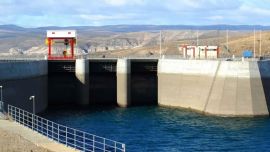Vista Oil & Gas, a model for independent drillers in Argentina's burgeoning shale fields, has cut compensation for senior management by 40 percent while trying to overcome the oil crisis.
Its CEO, Miguel Galuccio – who previously ran state-owned drilling company YPF SA – also shut down a dozen shale wells in March and is cutting capital spending for the rest of the year after demand for fuel plummeted in Argentina due to the coronavirus quarantine.
The measures are designed to protect the company's US$200-million cash balance until containment rules are lifted and consumption recovers, Galuccio said in a earnings call Wednesday. The call provided investors with the first broad public comments on activity in the Dead Cow formation after the oil industry plummeted last quarter.
"I've been through several crises," Galuccio said. "We will not panic. We'll keep calm, doing what we have to do."
The measures will position Vista to return in 2021 or even later this year, Galuccio said. Demand for fuel has already increased somewhat since Argentina eased some containment restrictions this week, he added.
The wage cuts to Vista executives, whose oilfield workforce has fallen by two-thirds, mirror those of some other energy companies around the world.
The collapse in oil prices has closed US shale wells and casts a long shadow over the future of Vaca Muerta in Patagonia. If drillers can achieve single-digit development costs - a measure sometimes used instead of the break-even point – that would keep the play going, Galuccio said.
Vista's development cost before closing the taps on the wells a month ago was US$10 to US$12 per barrel. In YPF's major shale oil fields, the range is about the same.
The company recorded a loss for the first quarter of US$21 million, 55 percent worse than the previous year's loss. The drill can reduce capital expenditures to just US$95 million in 2020, down from the February guidance of US$300 million, Galuccio said.
Galuccio, an oil veteran who is on the board of Schlumberger Ltd., also is hopeful the Argentine government, which I don't miss intervening in oil markets, will set subsidised prices to help producers with any crude they can sell in the country, even when refineries reach their capacity limits.
He pointed to fuel prices that remain unchanged in Argentina at about 57 pesos (86 cents) per litre as a sign that the government plans to help the drillers.
Subsidised oil prices, which Galuccio believes will come "sooner rather than later," would work as a bridge, he said, ensuring that production does not fall too precipitously now so that when fuel consumption recovers, Argentina will not be forced to import.
by Jonathan Gilbert, Bloomberg




















Comments